Who Killed JFK?
One of the more fascinating documentaries looking at the John Kennedy assassination (no, seriously) is by none other than a German filmmaker, Wilfried Huismann. Rendezvous with Death, aired recently on German TV, appears to make a strong case that Lee Harvey Oswald killed JFK at the behest of the Cuban government, which had information of several Kennedy-sanctioned plots to assassinate Cuban dictator Fidel Castro.
The London Telegraph notes that among those interviewed in the film is Oscar Marino, a former Cuban secret service agent who claims that the KGB brought Oswald to the Cubans' attention:
"... Marino, who fell out with the Castro regime, said the Cubans were desperate to eliminate Kennedy, an opponent of the revolution who wanted to kill Castro.
"'You ask why we took Oswald?' he said to the German film maker Wilfried Huismann. 'Oswald was a dissident: he hated his country. He possessed certain characteristics.
"'There wasn't anyone else. You take what you can get. . . Oswald volunteered to kill Kennedy.'"
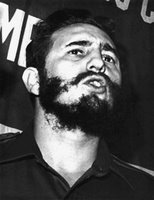
More intriguing, perhaps, is Huismann's research about what U.S. officials knew, or declined to pursue, about the Cuban connection. Among those interviewed is former FBI agent Lawrence Keenan. Shortly after the November, 1963, assassination, Keenan was dispatched to Mexico City to investigate reports that Oswald had met with Cuban diplomats two months earlier in that city's Cuban embassy. Recently released KGB documents, in fact, confirm that a meeting had occurred between a Cuban intelligence agent and Oswald.
But Keenan claims that then-FBI head J. Edgar Hoover pulled him off the assignment after only three days.
The Telegraph reports:
"'This was perhaps the worst investigation the FBI was ever involved in,' said Keenan.
"'I realised that I was used. I felt ashamed. We missed a moment in history.'
"Mexico City was considered a 'Pandora's Box' by the Johnson administration, which feared a war with Cuba were the truth to be revealed to the American people.
"'They were afraid of what will happen. They didn't want to. . . know the truth for fear it would mean we go to war. Johnson sincerely feared for his own life.' It was convenient therefore for the administration to paint Oswald as a loner.
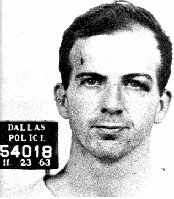
Another interview subject, Al "I'm in control here" Haig, claims LBJ was terrified that knowledge of a Cuban connection would spur a "right-wing uprising in America, which would keep the Democratic party out of power for two generations."
OK, I'm a bit skeptical of that contention by Haig, a Republican who was a military advisor under both Kennedy and Johnson. While no one appreciated political power better than Johnson, that level of Machiavellian motivation seems a bit of a stretch. Instead, I suspect Spiegel Online's Michael Scott Moore might be more on-target:
"He (Johnson) also may have averted World War III. Kennedy had faced down Soviet premier Nikita Krushchev over nuclear missiles in Cuba a year before, and if it turned out that Havana was behind the assassination of an American president, argued a former FBI agent named Laurence Keenan, who appears in the film and also attended the Berlin preview, most Republicans in America would have called for a 'dangerous' invasion of Cuba during a delicate phase of the Cold War. 'This was on their agenda,' Keenan said, 'ever since Castro came out of the mountains in 1959. He was a thorn in their side.'"
More plausible, it seems to me, is a legitimate fear that recognition of Castro's involvement in the Kennedy slaying would have led -- inevitably and justifiably -- to war with Cuba and, by extension, the Russians. And that would have been, um, pretty hairy.
But consider, if you would, the courage of a decision to avoid potential annihilation. If Rendezvous with Death is accurate -- certainly no given -- then it begs reflection on the responsibility of power. Can murder be tolerated in the service of a greater peace? Does a single wrong, even one as horrific as political assassination, warrant full-scale justice? Can a war be not only just, but actually serve as a vessel of justice?
It's just food for thought, or maybe plain ol' intellectual masturbation. Still, what I find most telling is that the responsibility of power is a topic not likely to intrude in the gingerbread dreams of our current White House occupants.










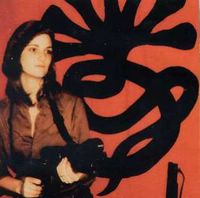

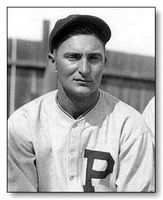

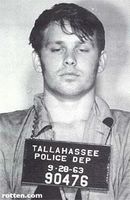








4 Comments:
That's the difference between our Texan presidents, isn't it? One knew the price of war and realized that whatever moral victory might come from it would be at a price perhaps too high.
The other, of course, never met a war he didn't like. Personally, I'm looking forward to a draft when we FINALLY get around to invading Iran, Syria, Israel, Madagascar (tricky penguins...) and New York.
Colonel Mustard, in the study... uh, with the candlestick.
Never have I seen Dems & Republicans agree 100 percent of the time on ANYTHING.
And yet...every president has refused any dialogue with Castro; if he dies, then it's Katie-bar-the-door, negotations are back on teh table.
Why...?
everything makes sense in light of this theory...our refusal to restore relations with Cuba after almost 50 years should be the tell-tale sign. after all, we have normalized relations with Vietnam, and that was one of the most divisive wars in our history, barring the Civil War, of course. our policy towards Cuba cannot be explained otherwise.
Post a Comment
<< Home